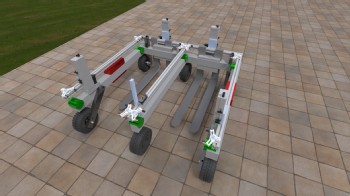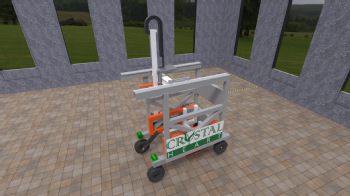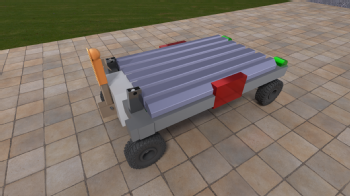Autonomous guided vehicles to transform horticultural labour shortage
· A new autonomous guided vehicle (AGV) is being developed to transform the horticultural sector and tackle the labour shortage
· The model which will work in glasshouse and outdoor areas moving trays and boxes around the production area, is being designed by researchers from WMG at the University of Warwick
· The project is part of the Agriculture and Horticulture Development Board SmartHort programme, which aims to improve labour efficiencies through technology and automations
An Autonomous Guided Vehicle is being designed by researchers at WMG, University of Warwick in a bid to help the horticultural sector tackle a labour shortage.
The Agriculture and Horticulture Development Board (AHDB) launched the SmartHort project in 2018 in a bid to help the sector’s economy by reducing labour requirements in horticulture through new technology and automation.
Leading automation experts from the WMG, University of Warwick are creating the model alongside three horticultural businesses; Crystal Heart Salad (lettuce propagators, Yorkshire), Valefresco (salads, Worcestershire), and WD Smith & Son (bedding plants, Essex).
The model will have the potential to work in both glasshouse and outdoor environments to automate the movement of trays and boxes around the production area, speeding up production.
Professor Robert Harrison from WMG, University of Warwick comments:
“We’ve been able to apply the cutting-edge technology developed in the automotive industry to the challenging environment of horticultural production.
“We reviewed existing AGVs to ensure there wasn’t an available product that could meet the growers’ needs, and have run a full analysis on the potential prototype to ensure the investment could be repaid through offsetting future labour costs.”
Our research teams is working on a solution to specifically address needs within the horticulture sector. Having captured the requirements, we have produced a configurable solution, which we are now progressing via prototype designs. Key aspects of the solution include the ability to work both indoors and outdoors and for it to be usable in conjunction with application-specific attachments of different types.
Grace Emeny, Knowledge Exchange Manager at AHDB, said: “With the lack of available labour an increasing pressure for many businesses, there is a growing need to automate more routine tasks to enable staff to be reallocated to more skilled jobs.
“There are two main barriers that prevent the uptake of automation. Many off-the shelf solutions don’t work for diverse horticulture production systems and often the return on investment doesn’t stack up in the current trading climate. WMG were tasked with addressing both of these challenges, which we believe they are well on their way to achieving.”
The overall goal is for the prototype to be developed commercially and is likely to cost around £30,000 to £50,000 depending on its configuration. So it’s available to all kinds of businesses in the sector.
James Bean, Crystal Heart Salad Co. comments:
“WMG have made several visits to our nursery. They have carried out a study of our logistics and have identified a design of autonomous vehicle which can improve efficiency and remove low-skilled manual tasks.
“We are excited to see this move to the next stage, to conduct real-life tests of the technology. If it fulfils expectations, it will make a fundamental change to our business.”
Grace added,
“We know horticulture is at the forefront of a digital revolution in farming and our SmartHort programme is designed to help connect growers with automation and robotics experts to help accelerate innovation. This project demonstrates the potential opportunities available from matching skills outside horticulture to meet the needs of the industry.”
The project is being funded by AHDB and match-funded by Innovate-UK-backed High Value Manufacturing Catapult.
Growers are invited to find out more about the project and to see how they can adopt automation in to their businesses at a special event, hosted by WMG, on 31 March 2020. To book, visit ahdb.org.uk/events.
To find out more about the SmartHort Automation Challenge, visit www.ahdb.org.uk/smarthort
ENDS
12 MARCH 2020
NOTES TO EDITORS
High-res images available credit to WMG, University of Warwick at:
https://warwick.ac.uk/services/communications/medialibrary/images/march2020/agritowingagv6.png
https://warwick.ac.uk/services/communications/medialibrary/images/march2020/agritowingagv4.png
https://warwick.ac.uk/services/communications/medialibrary/images/march2020/agrirobotagv2.png
https://warwick.ac.uk/services/communications/medialibrary/images/march2020/agritowingagv.png
Video available credit to WMG, University of Warwick at:
https://vimeo.com/374159926
WMG, University of Warwick
WMG is a world leading research and education group, transforming organisations and driving innovation through a unique combination of collaborative research and development, and pioneering education programmes.
As an international role model for successful partnerships between academia and the private and public sectors, WMG develops advancements nationally and globally, in applied science, technology and engineering, to deliver real impact to economic growth, society and the environment.
WMG’s education programmes focus on lifelong learning of the brightest talent, from the WMG Academies for Young Engineers, degree apprenticeships, undergraduate and postgraduate, through to professional programmes.
An academic department of the University of Warwick, and a centre for the HVM Catapult, WMG was founded by the late Professor Lord Kumar Bhattacharyya in 1980 to help reinvigorate UK manufacturing and improve competitiveness through innovation and skills development.
About AHDB
AHDB is a statutory levy board, funded by farmers, growers and others in the supply chain. Our purpose is to inspire our farmers, growers and industry to succeed in a rapidly changing world. We equip the industry with easy to use, practical know-how which they can apply straight away to make better decisions and improve their performance. Established in 2008 and classified as a Non-Departmental Public Body, it supports the following industries: meat and livestock (cattle, sheep and pigs) in England; horticulture, milk and potatoes in Great Britain; and cereals and oilseeds in the UK. AHDB’s remit covers 72 per cent of total UK agricultural output. Further information on AHDB can be found at www.ahdb.org.uk
About Crystal Heart
Crystal Heart is a greenhouse-based propagation business producing lettuce seedlings in trays.
Trays are currently moved by forklift trucks that can pick up, transport and set down 30 trays at a time. The picking up and putting down of the trays requires considerable experience and skill. However, the average travel distance can be several hundred metres, so a significant amount of time is taken travelling between locations in their 3.7 ha site, which involves little skill.
To use autonomous guided vehicles to move trays between locations, maintaining a constant supply to a skilled forklift truck driver but eliminating the travel time.
Some of the challenges to implementing existing industrial AGV systems in a glasshouse system include:
· Humid or dusty environment
· Ability to work indoors and outdoors
· Travel routes constrained by greenhouse posts and doors
· Tray placement locations need to be dynamic, as laying down areas are progressively filled
FOR FURTHER INFORMATION PLEASE CONTACT:
Alice Scott
Media Relations Manager – Science
University of Warwick
Tel: +44 (0) 2476 574 255 or +44 (0) 7920 531 221
E-mail: alice.j.scott@warwick.ac.uk
FOR FURTHER INFORMATION PLEASE CONTACT:
Alice Scott
Media Relations Manager – Science
University of Warwick
Tel: +44 (0) 2476 574 255 or +44 (0) 7920 531 221
E-mail: alice.j.scott@warwick.ac.uk
